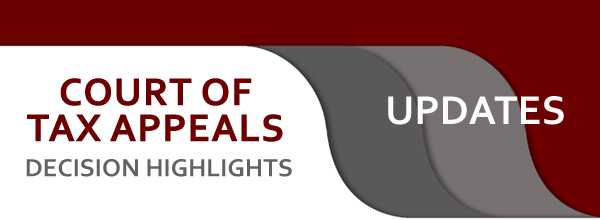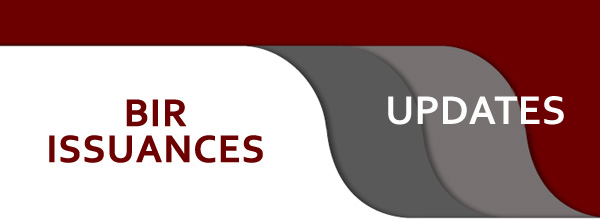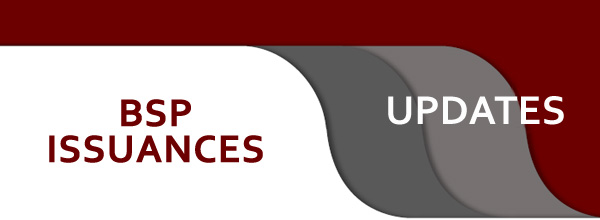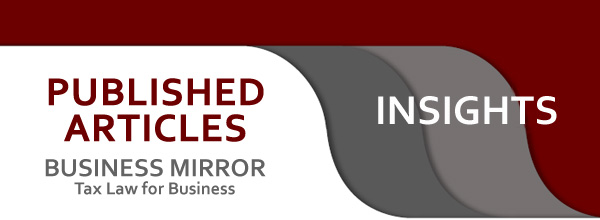

OCTOBER • VOL. 10• SERIES OF 2021
INSIGHTS is a monthly publication of BDB LAW to inform, update and provide perspectives to our clients and readers on significant tax-related court decisions and regulatory issuances (includes BIR, SEC, BSP, and various government agencies).

DISCLAIMER: The contents of this Insights are summaries of selected issuances from various government agencies, Court decisions, and articles written by our experts. They are intended for guidance only and as such should not be regarded as a substitute for professional advice.
Copyright © 2021 by Du-Baladad and Associates (BDB Law). All rights reserved. No part of this issue covered by this copyright may be produced and/or used in any form or by any means – graphic, electronic, and mechanical without the written permission of the publisher.
What's Inside ...
- HIGHLIGHTS FOR OCTOBER 2021
- SIGNIFICANT COURT DECISIONS
- Supreme Court
- Court of Tax Appeals
- SIGNIFICANT REGULATORY ISSUANCES
- Bureau of Internal Revenue
- Department of Finance
- Securities And Exchange Commission
- Bangko Sentral Ng Pilipinas
- Insurance Commission
- PUBLISHED ARTICLE
- Death and Taxes
- OUR EXPERTS
- The Personalities
- The Personalities


HIGHLIGHTS for OCTOBER 2021
SUPREME COURT DECISIONS
- In establishing a claim for refund of CWT, the claimant need only prove that taxes were actually withheld. (Commissioner of Internal Revenue vs. Ayala Corporation, G.R. No. 256539, July 28, 2021 [Date uploaded: 9/22/2021])
COURT OF TAX APPEALS DECISIONS
- RE Developers must secure the Certificate of Endorsement, among others, in order to qualify for VAT zero-rating under RA No. 9513 and its IRR. (North Luzon Renewable Energy Corporation vs. Commissioner of Internal Revenue, CTA Case No. 9886, September 6, 2021)
- Under RMO No. 43-90, the only BIR officials authorized to issue and sign an LOA are the Regional Directors, Deputy Commissioners, and the Commissioner. (Commissioner of Internal Revenue vs. PGA Sompo Insurance Corporation, CTA EB No. 2203 [CTA Case No. 9394], September 15, 2021)
- An assessment sans a categorical demand for payment within a specific date or period is, in legal contemplation, void. (People of the Philippines vs. Master Speed Shoe Bags Enterprises and Rito Alayon Jardeliza, CTA Crim. Case No. O-898, September 22, 2021)
- The CIR’s act of declaring taxpayer’s ITH as having been voided is ultra vires as this power is reserved exclusively for the BOI. (Mindanao Mineral Processing Refining Corporation vs. Commissioner of Internal Revenue, CTA Case No. 9643, May 19, 2021)
BIR ISSUANCES
- RMC No. 99-2021, September 1, 2021 – This provides for clarifications in relation to VAT exemptions of medicines and medical devices.
- RMC No. 101-2021, September 21, 2021 – This provides for the period for filing applications for VAT refunds and the period for processing.
DOF ISSUANCES
- FIRB Memorandum, September 9, 2021 – This provides the guidelines to monitor the compliance with the conditions prescribed under Fiscal Incentives Review Board (FIRB) Resolution No. 19-21 on the work-from-home arrangement for Registered Business Enterprises in the IT-BPM sector.
SEC ISSUANCES
-
SEC-OGC Opinion No. 21-10 dated September 21, 2021 – This is a legal opinion regarding redemption and retirement of preferred shares and reduction of capital stock.
BSP ISSUANCES
- BSP Circular No. 1126, September 14, 2021 – This adopts the Principles for Financial Market Infrastructures.
IC ISSUANCES
- IC Circular Letter CL-2021-52 dated September 10, 2021 – This provides for the guidelines on the consolidation and merger of insurance companies.


In establishing a claim for refund of CWT, the claimant need only prove that taxes were actually withheld.
The taxpayer had unutilized CWT for the CY 2012 and 2013. It filed an administrative claim, and subsequently a petition before the CTA, for the issuance of TCC for its alleged unutilized CWT for CY 2012 and 2013. The CTA partially granted the claim for issuance of TCC for the unutilized CWT.
Aggrieved, the BIR appealed to the Supreme Court insisting that proof of actual remittance of the withholding taxes is required for the claim for refund to prosper. In insisting proof of actual remittance, the BIR opined that it is incumbent upon the taxpayer-claimant to prove that the taxes withheld were actually remitted to the BIR by the withholding agents, not for the BIR to prove non-remittance of the same.
The Supreme Court upheld the decision of the CTA En Banc in that proof of actual remittance is not necessary for the taxpayer’s claim for refund of excess or unutilized CWT to prosper. Notably, it is the payor-withholding agent, and not the payee-refund claimant such as the taxpayer, who is vested with the responsibility of withholding and remitting income taxes. In establishing a claim for refund of CWT, the claimant need only prove that taxes were actually withheld through the presentation of the certificates of withholding issued by the corresponding withholding agents. (Commissioner of Internal Revenue vs. Ayala Corporation, G.R. No. 256539, July 28, 2021 [Date uploaded: 9/22/2021])


RE Developers must secure the Certificate of Endorsement, among others, in order to qualify for VAT zero-rating under RA No. 9513 and its IRR.
The taxpayer sought to refund excess unutilized creditable input taxes in relation to its zero-rated sales of renewable energy. The Court in Division denied the petition on the ground that the taxpayer should have submitted the following documents to prove that its sales qualified for VAT zero-rating:
1. Certificate of Compliance issued by the ERC which must be secured before the actual commercial operations; and
2. Certificate of Endorsement issued by the DOE.
Upon its motion for reconsideration, the taxpayer attached a certified true copy of its COC but the Court still found the submission insufficient. The Court ruled that the taxpayer still failed to prove that its sales qualify for VAT zero-rating due to its failure to present its COE issued by the DOE as required under RA No. 9513 and its IRR.
The Court likewise found no merit in the taxpayer’s contention that the provision of the IRR is not applicable to the sale of electricity by RE Developers, but only to transactions where securing a COE is feasible. Exemptions from tax are construed strictissimi juris against the taxpayer and liberally in favor of the taxing authority. (North Luzon Renewable Energy Corporation vs. Commissioner of Internal Revenue, CTA Case No. 9886, September 6, 2021)
Under RMO No. 43-90, the only BIR officials authorized to issue and sign an LOA are the Regional Directors, Deputy Commissioners, and the Commissioner.
The taxpayer was audited by the BIR initially pursuant to an LOA signed by the ACIR-LTS authorizing RO Marohombsar and GS Alberto. Thereafter, the OIC-Chief of the LTS-RLTAD II issued a Memorandum of Assignment assigning RO Pedrosa and GS Caling for the continuation of the audit to replace the previously assigned ROs. After receiving the assessment, the taxpayer filed a petition with the CTA alleging that the assessment is void due to the lack of authority of the ROs, among others. The Court in Division granted the petition and found the assessment void.
The Court En Banc upheld the ruling of the Court in Division. It held that only the CIR or his duly authorized representatives can authorize the audit of a taxpayer for purposes of assessment of deficiency taxes. Under RMO No. 43-90, the only BIR officials authorized to issue and sign an LOA are the Regional Directors, Deputy Commissioners, and the Commissioner. Other officials may be authorized to sign an LOA but only upon prior authorization by the CIR himself. Further, RMO No. 43-90 provides that any reassignment or transfer of cases to another RO shall require the issuance of a new LOA.
Considering that the OIC-Chief of the LTS-RLTAD II is not among the officials authorized to issue an LOA, the subject LOA is invalid for purposes of determining the validity of the assessment. (Commissioner of Internal Revenue vs. PGA Sompo Insurance Corporation, CTA EB No. 2203 [CTA Case No. 9394], September 15, 2021)
The specifically assigned RO must be named in the LOA and that only him or her may examine the books of account and other accounting records of a taxpayer pursuant to such LOA.
The taxpayer sought judicial relief against the assessment of the BIR. The Court in Division granted the petition and canceled and set-aside the BIR’s assessment on the ground that the RO who continued the audit was not armed with an LOA. The BIR argued that issuance of a new LOA is not necessary whenever there is a reassignment or transfer of cases to a new RO.
The Court denied the BIR’s motion for reconsideration. It ruled that an LOA is given to an appropriate RO assigned to perform assessment functions and that such LOA empowers that said RO to examine the books of account and other accounting records of the taxpayer. Therefore, it is clear that the specifically assigned RO must be named in the LOA and that only him or her may examine the books of account and other accounting records of a taxpayer pursuant to such LOA. (Exclusive Networks-PH, Inc. vs. Commissioner of Internal Revenue, CTA Case No. 9689, September 20, 2021)
An assessment sans a categorical demand for payment within a specific date or period is, in legal contemplation, void.
The accused was alleged to have willfully, unlawfully, and feloniously fail to pay deficiency VAT despite due notices and demands to pay. An Information was filed against the accused and the Court caused the determination of the existence of probable cause for the issuance of a warrant of arrest.
After evaluation of the Information and the supporting documents, the Court found no probable cause for the issuance of the warrant of arrest. In making its decision, the Court noted that the Formal Letter of Demand (“FLD”) and the Assessment Notice failed to demand payment of the tax due within a specific period. In particular, the FLD specifically stated that the accused is requested to pay its deficiency tax liabilities within the time shown in the enclosed assessment notice. The space for the due date in the attached Assessment Notice was, however, conspicuously left blank.
The requirement to indicate a fixed and definite period or a date certain within which a taxpayer must pay the assessed deficiency tax liabilities is indispensable to the validity of the assessment. Otherwise stated, an assessment sans a categorical demand for payment within a specific date or period is, in legal contemplation, void. (People of the Philippines vs. Master Speed Shoe Bags Enterprises and Rito Alayon Jardeliza, CTA Crim. Case No. O-898, September 22, 2021)
By failing to wait for the submission of the supporting documents to the protest to the FLD and FAN, the BIR unduly deprived the taxpayer of a real opportunity to be heard and thereby failing to satisfy the due process requirement under the law.
The taxpayer was assessed by the BIR and received a Formal Letter of Demand (“FLD”) on April 15, 2016. On May 16, 2016, the taxpayer filed its protest in the form of a Request for Reinvestigation. Thereafter, on June 28, 2016, the taxpayer received the Final Decision on Disputed Assessment (“FDDA”). The assessment was subsequently elevated and the Court in Division cancelled and set aside the assessment. Aggrieved, the BIR appealed the decision to the Court En Banc.
The Court En Banc affirmed the decision of the Court in Division and held that part of the due process requirement was violated. After filing a protest in the form of a request for reinvestigation, a taxpayer must be given a period of 60 days within which to submit all relevant supporting documents. In the instant case, the BIR issued the FDDA on June 28, 2016 which is merely 43 days after the filing of the protest in the form of Request for Reinvestigation, or on May 16, 2016. By failing to wait for the submission of the supporting documents to the protest to the FLD and FAN, the BIR unduly deprived the taxpayer of a real opportunity to be heard and thereby failing to satisfy the due process requirement under the law. (Commissioner of Internal Revenue vs. Philsaga Mining Corporation, CTA EB No. 2262, September 23, 2021)
A 1-page FLD and corresponding Assessment Notices, without the Details of Discrepancies, are void for being in violation of the taxpayer’s right to due process.
The taxpayer was assessed by the BIR for alleged deficiency taxes. A 1-page Formal Letter of Demand (“FLD”) with Assessment Notices was issued against the taxpayer. This prompted the taxpayer to seek the intervention of the Court. In questioning the assessment, the taxpayer alleged that the assessment is void for failure to state the facts and the law on which the assessment was made.
The Court cancelled and set-aside the assessment on the ground that the BIR failed to inform the taxpayer, in writing of the law and of the facts on which the assessment is made. In this case, the BIR issued a 1-page FLD, which merely enumerated the taxes and the corresponding amounts and computation, without informing petitioner of the facts and legal bases on which the assessments were made. While the 1-page FLD is accompanied by Assessment Notices, the information therein are practically the same as that found in the FLD. Ultimately, the FLD lacked the “Details of Discrepancies”. (Ateneo de Davao University vs. Commissioner of Internal Revenue, CTA Case No. 9779, September 23, 2021)


RR No. 18-2021,
September 10, 2021
This provides for the amendments on the affixing of the IRS and the use of the Enhanced IRSIS.
This amends provisions on the affixtures of Internal Revenue Stamps (IRS) on imported and locally manufactured cigarettes, heated tobacco products and vapor products for domestic sale or exports and the use of the Enhanced Internal Revenue Stamp Integrated System (Enhanced IRSIS) for the ordering, distribution, monitoring and report generation.
The regulation provided for procedures and guidelines for the following:
1. Enrollment of importers and local manufacturers of cigarette, heated tobacco products and vapor products (“importers” and “local manufacturers”) with enhanced IRSIS.
2. Ordering of IRS through enhanced IRSIS and BIR approval
3. Prior payment of excise tax on orders of IRS
4. Payment of the price of IRS. Escalation provisions
5. Release of IRS
6. Spoiled IRS, bad orders, losses, and replacement thereof
7. Affixture of stamps
8. Reporting requirements for affixtures of stamps, removals of products with affixed stamps, including spoiled, lost stamps and bad orders
9. Destruction of spoiled, bad order and factory defected stamps
10. Prohibition against possession and/or accumulation of previously affixed IRS or used/consumed packs/cartons of products with affixed IRS
11. Transitory provisions
12. Penalties
RMC No. 99-2021, September 1, 2021
This provides for clarifications in relation to VAT exemptions of medicines and medical devices.
This circular clarifies issues relative to the VAT exemption of certain medicines and other medical devices for COVID-19 under Section 109(1)(AA) and 109(1)(BB(ii) of the Tax Code, as amended by TRAIN Law and CREATE Act.
1. Effectivity for the VAT exemption of products in the consolidated list of VAT-Exempt products submitted by the Food and Drugs Administration (FDA) to the BIR – Shall take effect on the date of the publication by the FDA of the consolidated list of VAT-exempt products, which was on June 17, 2021.
2. Exclusivity of VAT exemption to the items enumerated in the consolidated list submitted by the FDA – Only the medicines and medical devices for COVID with the corresponding dosage strength, and dosage form and route of administration included in the consolidated list of VAT-Exempt Products submitted by the FDA to the BIR shall be considered as exempt from VAT.
3. Lists provided by FDA and were circularized last year to provide the frugs and medicines that are exempt from VAT under Section 109(1)(AA) of the Tax Code, as amended are no longer in effect – The consolidated list of VAT-Exempt Products provided by FDA to BIR and circularized through RMC No. 81-2021 is now the controlling list.
4. Treatment of the unutilized input VAT, if any, on the now VAT-exempt on-hand inventories – Unutilized VAT may be carried-over to the next succeeding taxable quarter/s or be charged as part of the cost. Input VAT which are directly attributable to goods now classified as VAT-exempt may be allowed as part of the cost. For input VAT that cannot be attributed to goods now classified as VAT-exempt, only a ratable portion thereof shall be charged to cost.
5. Tax refund will not be allowed for the supposed erroneously paid VAT on local purchases and importation (from their specified effectivity under RA 11534 on January 1, 2021 until the date of the FDA’s publication of the consolidated list VAT-Exempt Products on June 17, 2021) – A tax refund may be allowed only in cases where there is a change of status from VAT to Non-VAT registration.
6. Clarification of the phrase “provided that the input tax on imported items have not been reported as input tax credit in the monthly and/or quarterly VAT returns” of Section 3 of RR No. 18-2020, in order to refund the erroneously paid VAT on importation of VAT-exempt drugs. – It was included therein to ensure that the imported items have not been reported and claimed as input tax credit.
However, the taxpayer may be allowed to reflect the said importation as part of the "Purchases not Qualified for Input Tax"
7. If corresponding VAT on imported drugs or medicines in the preceding paragraphs has been claimed as input tax credit in the monthly and quarterly VAT returns, it cannot be allowed for refund under Section 204(C) of the Tax Code – This is already a utilization of input tax.
RMC No. 101-2021,
September 21, 2021
This provides for the period for filing applications for VAT refunds and the period for processing.
This circular extends the deadline for the filing of applications and suspends the 90-day processing of VAT refund claims pursuant to Section 112 of the Tax Code, as amended by TRAIN Law with the VCAD.
Following the temporary closure of VCAD until October 3, 2021, in compliance with the existing health protocols for the mitigation of the COVID-19 pandemic, the filing of VAT refund, where 2-year period within which to file the claim falls on September 30, 2021, shall be extended until October 15, 2021.
Moreover, the 90-day period of processing of all VAT refund claims pending with VCAD during temporary closure is also suspended pursuant to Section 5(3) of the RR No. 27-2020.


FIRB Memorandum September 9, 2021
This provides the guidelines to monitor the compliance with the conditions prescribed under Fiscal Incentives Review Board (FIRB) Resolution No. 19-21 on the work-from-home arrangement for Registered Business Enterprises (RBEs) in the IT-BPM sector
RBEs of the IT-BPM sector covered by the temporary measure must satisfy all of the following conditions to maintain their incentives and/or period of availment:
1. The number of employees under a WFH arrangement:
-
-
- Not to exceed 90% of the total workforce
- Reduced to 75% from January 1, 2022 until the remainder of the period of the temporary measure.
- Maintained at 90% until March 31, 2022 if the State of Calamity is extended to any date beyond January 1, 2022
-
2. The number of laptops/other equipment outside the ecozone should not exceed the number of its WFH employees
3. Bonds shall be posted for all equipment deployed by the RBE to their employees' homes
4. Revenues from export shall be maintained regardless of the allowed ratio of employees who will work from home. Provided, The current number of employees shall not be reduced regardless if the majority of their employees are working from home
5. The RBE shall comply with reportorial requirements and site inspections.
RBEs are required to submit to the investment promotion agencies (IPA) the following:
1. On or before September 30, 2021
a. a list of equipment and other assets brought out of the economic or freeport zones with the following details:
• Quantity;
• Acquisition cost and book value; and
• Amount of bond paid to cover 150% of the amount of taxes and duties (if imported) and VAT (if locally sourced).
b. total number of employees and the number of employees under the WFH arrangement; and
c. a certification that the export requirement and number of employees will be maintained.
2. Within 5 days after the end of each month, a report on the following:
• Additional equipment and other assets brought out of the economic or freeport zones; and
• The total number of employees and the number of employees under the WFH arrangement.
The concerned IPA shall submit to the FIRB Secretariat the following:
1. On or before October 15, 2021, and 15days after the end of each month, a list of registered IT-BPM enterprises availing of the WFH arrangement including the details submitted by the RBEs to the IPAs.
2. Within 30 days from the expiration of the period of the WFH arrangement, a list of registered IT-BPM enterprises with the following details:
• Quantity of laptops, desktops, or other assets brought out of and returned to the economic or freeport zones; and
• Proof of payment of taxes and duties or forfeiture of surety bond on laptops, desktops, or other assets that were not returned to the economic or freeport zones.
Within 5 days from the knowledge of any violation of an RBE, the concerned IPA must notify the FIRB of the said violation.


SEC-OGC Opinion No. 21-09
dated June 22, 2021
This is a legal opinion regarding the annual meeting via remote communication in non-stock corporations.
A non-stock condominium corporation is uncertain as to the legal requirements on the valid conduct by the corporation of an annual meeting through remote communication considering that its bylaws do not contain any provision that recognizes and/or allows remote communication as a valid means of conducting an annual members’ meeting.
According to the SEC, when the bylaws of the corporation do not have a provision that allows voting through remote communication the members may still validly vote through remote communication on the basis of a resolution issued by the majority of the board of trustees of the corporation authorizing such mode of voting which is recognized and allowed under the Revised Corporation Code (RCC). However, it should be noted that, in this case, voting through remote communication is only applicable for the particular meeting stated in the said resolution, as clarified by Section 12 of Memorandum Circular No. 6-2020. Hence, corporations are highly encouraged to amend their bylaws, if attendance and voting via remote communication are not yet specifically provided therein, to allow corporations to be more adaptive to technological changes, and more importantly, to ensure that the right of stockholders/members to participate in meetings and to vote on matters presented therein are recognized and protected.
SEC-OGC Opinion No. 21-10 dated September 21, 2021
This is a legal opinion regarding redemption and retirement of preferred shares and reduction of capital stock.
A corporation intends to redeem, at par value, all of the non-voting, non-participating, non-convertible, and redeemable preferred shares it has issued. It has sufficient assets to cover its debts and liabilities prior to and after the proposed redemption. The issue is whether it can redeem the preferred shares at par value even without unrestricted retained earnings, and without violating existing laws as well as the trust fund doctrine.
According to SEC, although the general rule is that there must be unrestricted retained earnings before a corporation can redeem, repurchase, or reacquire its own shares, the exception is when the shares to be redeemed are redeemable as provided in the articles of incorporation and certificates of stock of the corporation. However, for any redemption of said shares to be valid, there must be sufficient assets to cover the debts and liabilities of the corporation, as in this case. However, the corporation’s amended Articles of Incorporation is silent on the “reissuable” nature of its redeemable preferred shares. As such, once its shares are redeemed, the same shall be considered retired and may no longer be reissued. To eliminate the treasury shares, the corporation must file an application for a decrease of authorized capital stock with the Commission and comply with all the requirements set forth in Section 37 of the RCC which states among others, that no decrease of authorized capital stock shall be approved by the Commission if its effect shall prejudice the rights of corporate creditors.


BSP Circular No. 1126,
September 14, 2021
This adopts the Principles for Financial Market Infrastructures (PFMI)
The Monetary Board approved the adoption of the PFMI pursuant to Circular No. 1089 dated July 07, 2020 or the Payment System Oversight Framework (PSOF) and RA No. 11127 or the National Payment Systems Act (NPSA), and the related amendments to the Manual of Regulations for Payment Systems (MORPS), as follows:
- Relevant Principles. The PFMI is a set of international standards designed to strengthen FMls and make them more resilient to financial crises, and participant defaults.
The required adoption by the designated payment systems (DPS) shall, at a minimum, extend to principles relevant to payment systems in the country. These principles shall be applied holistically and not on a stand-alone basis given that some principles are built upon others while some complement others. - Adoption by DPS. The adoption of the applicable principles by the DPS shall depend on whether it is designated as a systemically important payment system (SIPS) or prominently important payment system (PIPS).
- Critical Service Providers (CSPs). The Bangko Sentral sets the expectations to be met by CSPs.
- Assessment by the Bangko Sentral. The Bangko Sentral shall adopt the PFMI assessment methodology (AM) to evaluate the observance of the relevant principles by a DPS as well as identify possible risks and induce changes in the NPS.
- Enforcement Action. The Bangko Sentral may deploy enforcement actions to ensure compliance and bring about timely corrective actions. Any violation shall subject the DPS, its participants, and/or their directors, officers, and/or employees to the sanctions set forth in Sections 36 and 37 of R.A. No. 7653, as amended, and Sections 19 and 20 of R.A. No. 11127, as appropriate.


IC Circular Letter
CL-2021-52 dated September 10, 2021
This provides the guidelines on the consolidation and merger of insurance companies.
This Circular provides the Omnibus Guidelines on the Consolidation and Merger of lnsurance Companies:
1. Requirement of notification in writing to the lnsurance Commissioner at least 30 days prior to any board action to approve any Plan of Merger or Plan of Consolidation (Plan);
2. Approval of the Plan by a majority vote of the board of directors of each company (with the specific information in addition to those required by the SEC);
3. Approval of the Plan by the stockholders representing at least 2/3 of the outstanding capital stock of each of the constituent companies;
4. Execution of the Articles of Consolidation or Merger by each of the constituent companies, to be signed by the President or Vice President and certified by the Secretary or Assistant Secretary of each constituent company;
5. Inclusion in the Articles of an undertaking to discharge all said companies' respective accrued liabilities;
6. Notice sent to all policyholders and creditors within 20 days after the execution of the Articles;
7. Secure the favorable recommendation of the lnsurance Commissioner;
8. Examination or verification by the Insurance Commission for the purpose of determining the financial condition of the constituent companies;
9. Review of the submissions by the Insurance Commission;
10. Filing with the SEC of the signed and certified Articles and the lnsurance Commissioner's Endorsement;
11. Surrender by the constituent companies of their respective certificates of authority to transact insurance business;
12. Filing with the lnsurance Commissioner of the corresponding application for the issuance of a new certificate of authority to transact insurance business; and
13. All mergers and consolidations shall be completed within 12 months from the time the lnsurance Commissioner was first notified of the proposed merger or consolidation
IC Circular Letter
CL-2021-53 dated September 10, 2021
This provides the guidelines on foreign currency-denominated investments and insurance policies.
The Circular provided guidelines on foreign currency denominated investments and insurance policies.
It provides that only foreign currencies acceptable to the BSP as part of its international reserves shall be allowed as investments by insurance/reinsurance and mutual benefit associations.
The circular specified the allowed investments categorized into:
• foreign currency-denominated debt and equity securities
• Collective Investment Schemes (CIS) subject to prior approval of the Insurance Commission provided, however, that the underlying basket is fully or substantially composed of fixed-income securities or when the basket is composed of equity securities, it must be that of a broad-market index
• Unrated financial instruments
Options and Futures, in addition to Swaps and Forwards, are now allowable derivative instruments, provided, however, that it shall be used for hedging the risk of foreign currency-denominated assets.
Offshore investments described may be allowed to enable insurance companies to achieve risk diversification, enhanced portfolio liquidity, hedging, ability to sell foreign currency-denominated insurance products depending on the client's risk yield preferences, and for other purposes, as may be allowed by the Insurance Commission.
Foreign currency denominated investments described under Section 2.1.2 to 2.4 may only be allowed subject to the prior approval of the Insurance Commission.


Death and Taxes
By Atty. Mabel L. Buted
Tax is as certain as death. Tax is a natural consequence of death for individuals leaving significant amount of assets to their loved ones. Some people are able to plan ahead to manage their asset base in the event of death. Tax may not be the primary driver but it is always a key factor to consider.
The significance of estate tax planning has been minimized with the implementation of various tax reforms where tax rates had been made uniform regardless of the mode of disposition of the properties. But other than the tax rates, there are many other factors that could differentiate the tax impact of a specific mode of disposition over other modes of transfer of properties. Before you even consider those other modes of transfer, let me discuss the taxes associated with death.
Estate Tax. The usual tax associated with death is the estate tax. It is the tax on the fortune left by a deceased before this is distributed to the heirs which is levied, assessed, collected and paid upon the transfer of the net estate. The present tax rate is 6%, which is imposed on the value of the net estate.
Donor’s Tax. This a tax that is imposed on a gratuitous transfer of property. It is levied, assessed, collected and paid upon the transfer by any person of a property by gift or donation. Previously, the tax was imposed at the graduated rate of 0% to 15% and a higher rate of 30% if the beneficiary is a stranger. The Tax Reform for Acceleration and Inclusion eliminated the graduated rate and the difference between the tax rate for strangers and non-strangers and replaced these with a uniform rate of 6%.
How does donation come into play on the transfer of properties left by a deceased loved one? Is donor’s tax imposed when properties are simply being distributed to the heirs?
The transfer of properties from the estate of the deceased to any heir is not a donation. Hence, the donor’s tax does not apply but the manner of distribution among the beneficiaries may result in donation and attract donor’s tax. This happens when a beneficiary waives his share in the hereditary estate. The waiver of inheritance may amount to a donation of the property, subject to the donor’s tax. However, not all waivers will yield the same result.
When is a waiver of inheritance not considered a donation?
According to the Revenue Regulations (RR) No. 12-2018, the general renunciation by an heir, including the surviving spouse, of his share in the hereditary estate left by the deceased is not subject to donor’s tax. This is echoed by the recently issued Revenue Memorandum Circular (RMC) No. 94-2021. A number of rulings issued by the tax authorities justified the non-imposition of donor’s tax by referring to the right of accretion under the rules on succession as provided in the Civil Code. In the right of accretion, the heir who renounces or cannot receive his share is added or incorporated to that of his co-heirs, co-devisees or co-legatees. His share accrues to his co-heirs in the same proportion that they inherit. Consequently, the heir can never be considered to have owned his share in the inheritance that he renounced. He could not donate a property that he never owned. This is the reason why there is no donor’s tax that can be imposed upon waiver of an heir’s share in the hereditary estate.
When does a waiver of inheritance considered a donation? There are at least two instances:
1. RR 12-2018 implies that a renunciation of share in hereditary estate shall be treated as donation when an heir declines the inheritance and offers it in favor of one or more of his co-heirs.
2. The other instance is that provided in the recently issued RMC 94-2021. While the regulation recognizes that a general renunciation is not subject to donor’s tax, a donor’s tax will be imposed on the partial renunciation of inheritance as a result of the waiver. This happens when an heir waives his share to only identified properties but not to the entire properties of the deceased, resulting to the heirs receiving lower or higher value than their rightful share.
I register my reservation on this. Co-ownership is discouraged and all the heirs cannot be expected to co-own each of the properties left by the deceased. To avoid this scenario, the heirs usually resort to identifying and allocating the properties that each one of them will receive. In fact, the laws do not require each of the properties of the estate to be distributed to all of the heirs. They are allowed to agree on the properties to be assigned to each. While this may result in unequal sharing, as it is impossible to expect the properties to be of equal value, there is no taxable repudiation. The fact that the heirs would be receiving lower or higher values than their supposed proportionate share in the estate is a necessary consequence of the nature of the properties of the estate. However, the heir who is receiving properties of lower value cannot be said to be making a taxable repudiation. To say so would discourage the preservation of properties and encourage their disposition only for the purpose of having equal sharing for all the heirs.
Besides, the reason for the non-imposition of donor’s tax in a general renunciation still applies. An heir who receives a property of lower value than his rightful share is not considered to have received his share in full. Not being the owner of the difference between his share and the value of the property actually received – that difference in value could not be donated and therefore could not be subject to donor’s tax.
Having said that, this is already part of the rules. The tax impact should be taken into consideration when making distributions of the estate properties.
----------------------------------------------
For inquiries on the article, you may call or email
ATTY. MABEL L. BUTED
Senior Associate
T: +63 2 8403-2001 local 312
This email address is being protected from spambots. You need JavaScript enabled to view it.



DISCLAIMER: The contents of this Insights are summaries of selected issuances from various government agencies, Court decisions and articles written by our experts. They are intended for guidance only and as such should not be regarded as a substitute for professional advice.
Copyright © 2021 by Du-Baladad and Associates (BDB Law). All rights reserved. No part of this issue covered by this copyright may be produced and/or used in any form or by any means – graphic, electronic and mechanical without the written permission of the publisher.






